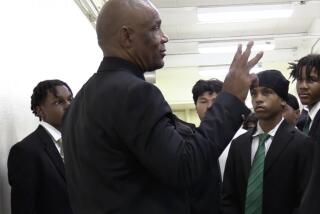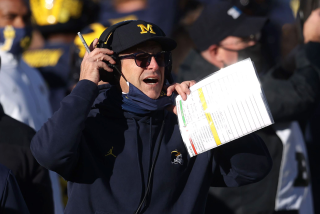His Spirit Lives On : Colorado Players Draw Inspiration From Memory of Sal Aunese
- Share via
BOULDER, Colo. — Colorado acknowledges Sal Aunese as if he is still present. “Sal says” and “Sal is,” the Buffaloes say. They nominate him for MVP awards, wear his name on their jersey sleeves, and point to the places he should and used to be.
There is more than just a season going on at Colorado. A team that a year ago was blighted by arrests plays with greater cause and emotion than anyone in the country after burying its 21-year-old quarterback. That the Buffaloes are undefeated at 5-0 and ranked No. 3 is the least of what has happened here.
On Sept. 23 at 8:47 p.m. Aunese died of stomach and lung cancer. But as a clergyman told them during a memorial service, and as running back Eric Bieniemy repeats over and over: “Sal’s still here. You just have to point a little higher.”
The death of Aunese and the fervent play of the Buffaloes have apparently drawn together a team once rife with trouble. From January 1986 to Jan uary 1989, there were 24 arrests (18 in 1987) involving current or former football players, ranging from two rape accusations (both acquittals) to misdemeanor assaults such as throwing a magazine at a person. Just as public outcry reached a height, Aunese fell ill, and so they were struck by a humiliating alienation on campus and overwhelming grief at the same time.
Over the last six months there have been several player departures and some searching discussions with campus officials, police, counselors and each other. There has also been the hard spiritualism of Coach Bill McCartney, who during a memorial service acknowledged publicly for the first time that Aunese fathered the son born last spring to his 19-year-old daughter, Kristin.
So this overwrought season has become both a public memorial to Aunese and an attempt at redemption by the Buffaloes. They aspire to the Orange Bowl and a shot at the national championship; their last outright Big Eight championship came in 1961, and not since 1977 have they been ranked higher than both of the perennial conference champions, Oklahoma and Nebraska. On a board in their meeting room is a sketch of a set of steps, each one labeled with the name of an opponent. At the top it says, “Sal.”
“We went through a lot,” McCartney said. “But you forge a sword in fire. Going through a furnace of affliction has a way of bringing you together.”
How they have individually dealt with the turmoil is more complicated. McCartney has not com-mented on his grandson again. Aunese’s best friend, defensive tackle Okland Salavea, returns to his room each night after practice and talks as though Aunese is with him. Sophomore quarterback Darian Hagan, once known for brashness, has quieted. “I’ve lost all that,” he said. “There’s no place for mouthiness.” Bieniemy instinctively glances up at the private box where Aunese watched the first three games of the season with oxygen tubes across his thinning face. His intention was to live until the Oklahoma game on Oct. 28.
“I really believe Sal is a major part of this team, how it came together,” Salavea said, eyes welling. “When he was diagnosed, everyone dropped to their knees. We all looked at each other and said, ‘Why Sal?’ And there’s just no answer. Sal told us there’s nothing we can’t do, that it all depends on us. That’s what we’re carrying right now.”
Against Iowa State Saturday, the Buffaloes were seeking to become 6-0 for the first time since 1961. They have manhandled every opponent regardless of how respectable, including Texas (27-6), Illinois (38-7) and Washington (45-28). Their 204 points scored is an all-time high for the school after five games. The Washington game was particularly indicative of the power of their option offense, as they led by 38-6 after three quarters and scored the most points by a visiting team in Husky Stadium in 60 years.
For his part, Aunese was no angel certainly, merely a talented, handsome fellow of Samoan descent who had his shortcomings like anyone else. In 1988 he served 12 days in jail after pleading guilty to misdemeanor assault. He was also an intelligent and admired leader, majoring in sociology and on schedule to graduate, taking summer classes even as he was treated for his illness.
Also at the same time, he sought to help remedy a team torn by its past and experiencing occasional dissent and murmurs of destructive egos. “Sometimes you’d have a guy trying to do too much, and another guy not doing enough,” defensive tackle Art Walker said. “There was some complaining, bickering.” They were somewhat isolated from an angered campus and sometimes from each other.
“There were guys on this team I didn’t even know,” Salavea said quietly. “That’s embarrassing. Now it doesn’t matter where you see them or what you’re doing, you stop and talk to them. You ask them how they are.”
Aunese left behind a letter to the team urging the players to pull together and to make the Orange Bowl. “We had to start doing things together,” Bieniemy said.
Aunese has also become a sort of constant second thought for the Buffaloes, an internal caution and reminder of their new code of behavior. As players who normally had little to say to each other began collecting in groups, monitoring of each other became a habit. The Buffaloes say that has helped prevent more incidents like those over the last two years. “Everybody is there to talk you out of whatever bad, stupid thing you’re about to do,” Salavea said.
Many of the problems were minor, a handful of them major. Aunese’s trouble came when he pleaded guilty after tearing up a dormitory, enraged by what he said was a racial slur. Bieniemy pleaded no contest to disorderly conduct after a bar fight as a freshman, also saying he was angered by a racial remark. There was a shoplifting offense that resulted in suspension; someone else had an argument with a girlfriend.
The incidents occurred on an otherwise quiet, affluent campus of pink granite and tiled roofs at the foot of pine-studded mountains. It is known for bandleader Glenn Miller, who as an undergraduate would drive up to the mesas and play under the moon and his headlights. Also for Supreme Court Justice Byron White, who as the Whizzer led the Buffaloes to an 8-0 start in 1937, and for Hale Irwin, a defensive back who graduated in 1966 and became a U.S. Open golf champion.
It is also a campus where minorities make up 10.3 percent of the student body of 24,365, with 867 Hispanics, 905 Asians and 343 blacks. That, coupled with the usual ambivalence of a campus toward its football team, may have exacerbated some of the clashes. “They were saying (urban) people like us were the problem,” Walker said. To Salavea, an imposing figure with close-clipped black hair and a dangling braid, perceptions and labels were partly responsible. “People said, ‘They’re just football players. They’ll do what’s expected of them -- nothing good at all.’ ”
Bieniemy said, “We set ourselves up for it. It never would have happened if we had thought twice. People were pointing us out, but we also let ourselves in for it.”
McCartney steadfastly maintains there was no severe discipline problem on the team, more a series of clashes with townspeople or other students in a small, protective community with some strict ordinances. Even so, severe action was taken: of the two players acquitted of rape, one chose to leave, the other was asked to. Several other players on the spring roster are gone, for various reasons. “We weren’t experiencing anything that society in general doesn’t undergo,” McCartney said. “Boulder is a unique place, and some inner-city kids had to adjust to it. ... I felt we ran a disciplined program, and yet we were having all these altercations. We had to call them to account in a stricter way.”
There have been no reported instances of encounters with police since the spring. Exchange and counseling programs between players and police were mandated by university officials to alleviate tensions.
A truer indication of whether Colorado has put behavioral problems behind is more likely to come later. But getting over the loss of Aunese is another thing. That healing process will also go far beyond one season.
“I don’t think there’s been a recovery,” Bieniemy said. “We’ve adjusted. I don’t think we’ll ever recover.”
More to Read
Go beyond the scoreboard
Get the latest on L.A.'s teams in the daily Sports Report newsletter.
You may occasionally receive promotional content from the Los Angeles Times.










